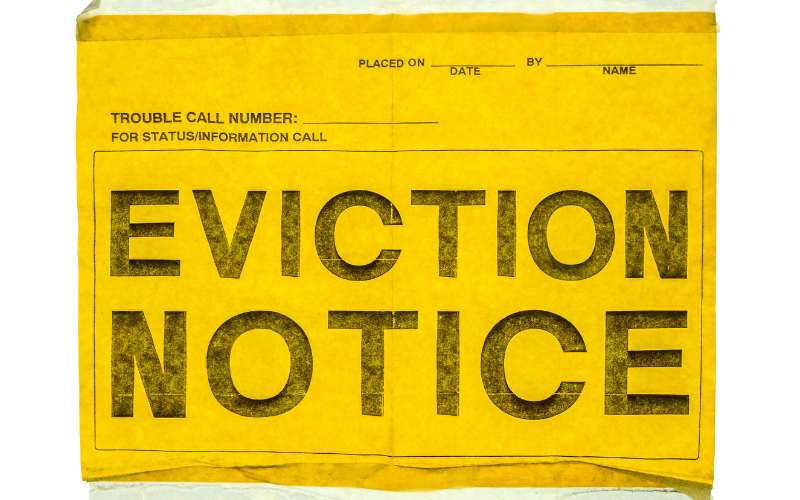Last Updated on March 18, 2024 by Kelvin Nielsen
Do you rent a federally-subsidized housing? If you do, your landlord must serve you a 30-Day Demand for Rent or Possession in Colorado in order to evict you from the property.
The notice will then give you up to 30 days to pay the rent due or move out. If you continue living on the property after the 30 days and haven’t paid the rent due, the landlord may file an eviction lawsuit against you.
Under Colorado law, federally subsidized housing includes the following.
- Section 8 housing, public housing, or any other type of housing for which the landlord gets a subsidy from the federal government.
- A VA or FHA loan that’s financed by a federally backed mortgage.
- Housing that is situated in a project that receives funding from the federal government. An example of such housing is a Low Income Housing Tax Credit (LIHTC) development.
The following are answers to commonly asked questions regarding the 30-Day Demand for Rent or Possession in Colorado.
How Must Landlords Serve The 30-Day Demand For Rent Or Possession In Colorado?
First and foremost, the notice must be in writing. The landlord must also include the following information.
- Tenant’s name and address.
- Landlord’s name and address.
- The rental property’s address.
- The rent amount you owe the landlord.
- A statement that you must pay the rent balance in its entirety within 30 days or move out.
Next, the landlord must deliver it to you via either of the following ways. They can deliver the notice in person, leave the notice with a person of suitable age in your absence, or post the notice in a conspicuous area on the property.
Related Posts:
What is the CARES Act in Colorado?
The Coronavirus Aid, Relief, and Economic Security (CARES) Act was passed by the U.S. Congress in March 2020. And even though the eviction moratorium of the Act had expired, the Colorado Supreme Court, on May 15th, 2023, held that the CARES Act’s 30-Day Notice is still in effect.
A landlord must still provide a tenant living in a subsidized housing a 30-Day Demand for Rent or Possession in Colorado before filing an eviction lawsuit.
As a tenant in Colorado, the following are some important things to keep in mind when it comes to the CARES Act.
- The act doesn’t apply to all tenants. It only applies to those living in federally subsidized housing.
- The act doesn’t prohibit landlords from evicting tenants. It only requires landlords to provide the tenants with a 30-day eviction notice before filing a lawsuit.
- A tenant may still have other rights under the Colorado Residential Landlord & Tenant Act. Including, the right to fight the eviction after the landlord files an eviction lawsuit.
What Can A Landlord Do After the CARES Act 30-Day Notice Requirement?
After meeting the CARES Act 30-Day Notice requirement, the landlord can choose to file an eviction lawsuit against you in court. The following is a basic overview of the processes the landlord must follow to remove you.
#1: File an eviction lawsuit in court.
The filing must be in the appropriate county court. After successful notarization by the court’s clerk, the landlord will be issued with a copy of the Summons and Complaint.
But unlike the 30-Day Demand for Rent or Possession, the Summons and Complaint must not be served by the landlord. It must be served by someone who is 18 years or older, or who isn’t part of the case 7 days before the hearing.
#2: Attend the court hearing.
In Colorado, eviction hearings normally take place between 7 and 14 days after the summons was issued. As a tenant, you’ll have the opportunity to file an answer either before or during the eviction hearing.
An answer is a reason you can give the court as a defense against your eviction. An example of a legal defense would be that the landlord tried to carry out an illegal “self-help” eviction.
#3: Writ of Restitution is issued.
If the judgment is in your landlord’s favor, the court will issue them with a writ of restitution. This will be your final notice to move out. The landlord must issue the writ to you at least 48 hours after the judgment is entered.
Conclusion
The 30-Day Demand for Rent or Possession in Colorado is a special provision under the CARES Act. It requires that landlords provide tenants living in federally subsidized housing with a notice of at least 30 days before filing an eviction lawsuit. Normally, for all other rental types, the landlord would only need to serve either a 5- or 10-day eviction notice for failure to pay rent.
And as part of the rights you have under state law, the eviction process must be proper. The landlord must have a ‘just cause’ to evict you. Also, they must follow due process and abide by retaliatory and discrimination laws.
Disclosure: The content herein isn’t a substitute for advice from a professional attorney. It’s only meant to serve educational purposes. If you have a specific question, kindly seek expert attorney services.
Sources: Colorado Landlord & Tenant Law, CARES Act, Tenant Defenses to Evictions in Colorado

I am a real estate attorney with over 11 years of experience in tenant eviction cases. My mission here at LTRC is to help answer your commonly asked questions on everything regarding real estate laws, especially on eviction matters.
I’m a member of the following professional organizations: Attorneys’ Real Estate Councils of Florida (ARECs), Florida Bar Real Property, Probate & Trust Law Section, American College of Real Estate Lawyers (ACREL), and the Florida Association of Community Managers (FACM).







